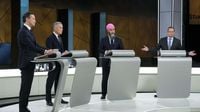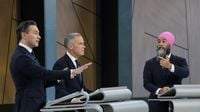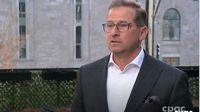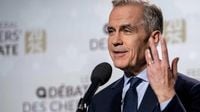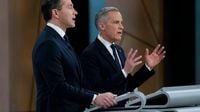In a heated English-language leaders' debate held on April 17, 2025, Canadian Prime Minister Mark Carney faced fierce challenges from his main opponents, Pierre Poilievre of the Conservative Party and Jagmeet Singh of the New Democratic Party (NDP). With only 11 days left until the federal election on April 28, Carney found himself physically and politically sandwiched between Poilievre, who aimed to portray him as incapable of enacting real change, and Singh, who sought to question his concern for ordinary Canadians.
After two hours of intense exchanges, Carney remained steadfast, needing to withstand the barrage of attacks to maintain his lead in the polls. The stakes were high for Poilievre, who needed a standout performance to sway voters in Ontario, a crucial province for his party's chances of forming a government.
During the debate, Poilievre aggressively questioned Carney about the rising cost of living and his past advisory role to former Prime Minister Justin Trudeau. "Are you going to look into the camera and apologize to the many people who have suffered due to inflationary policies that resulted from your advice to Justin Trudeau?" Poilievre demanded. Carney responded coolly, stating, "I know you want to campaign against Justin Trudeau. Justin Trudeau is not here. Do you deny that you were his economic advisor?" This exchange was pivotal, as Poilievre aimed to blur the lines between Carney and Trudeau's policies.
Singh, not to be outdone, accused Carney of being in the pocket of big business and the wealthy. He pressed, "Who are you really working for?" Meanwhile, Yves-François Blanchet, leader of the Bloc Québécois, emphasized his party's intent to work with the next federal government, provided that Quebec's interests remain a priority. He asserted, "Respect us, and we will be partners, and we will be stronger in negotiations with the United States."
Both Singh and Blanchet made a case for a minority government, arguing that they would effectively defend workers' rights and Quebec's interests. However, observers questioned whether their appeals would resonate with voters, especially given the recent memories of a paralyzed Parliament due to obstructionist tactics.
As the debate unfolded, Carney maintained his composure, responding to attacks with a calm demeanor that suggested he was untouchable. When Poilievre accused him of taking orders from the same aides as Trudeau, Carney shot back, "I compose my own talking points, thank you very much." His poise under pressure made him appear unreachable, as if he had a protective barrier against the criticisms thrown his way.
In the lead-up to the debate, polls indicated that the Liberal Party, led by Carney, was holding an 8-point lead over the Conservatives. A Nanos Research poll completed on April 17 showed the Liberals at 45% and the Conservatives at 37% nationally. The NDP trailed with 8%, followed by the Bloc Québécois at 6%. Carney also enjoyed a 14-point lead over Poilievre in terms of voter preference for Prime Minister.
Carney's strategy during the debate included shifting the focus onto Donald Trump, whom he identified as a significant threat to Canadian economic stability. "The greatest risk to affordable prices and our economy is Donald Trump; we must get this right," he stated. His remarks came in the context of a campaign heavily influenced by tensions with the United States.
In response, Poilievre argued that the Canadian economy had weakened under a decade of Liberal leadership. He stated, "We need change, and you are not the change," while criticizing the Liberal government's handling of energy policy, claiming it had given Trump a near-monopoly on Canadian energy resources by failing to build necessary pipelines for oil exports.
The debate highlighted the contrasting visions each leader has for Canada, with Carney advocating for a strong defense against external threats while Poilievre focused on domestic economic issues. As the election approaches, the candidates are acutely aware that public perception can shift rapidly, especially in the final days of the campaign.
On April 18, voting by anticipation began for those unable to cast their ballots on election day. This early voting period could play a crucial role in determining the outcome of the election, as many Canadians take advantage of the opportunity to vote ahead of time.
In a recent statement, Blanchet expressed his belief in a comfortable victory for Carney's Liberals, suggesting that voters no longer see Poilievre as a viable candidate for Prime Minister. He remarked, "I think voters no longer believe that Mr. Poilievre will be Prime Minister of Canada." The Bloc leader emphasized that Quebec voters would likely want to preserve their unique identity and interests, hinting at a potential shift in support away from the Bloc in favor of the Liberals.
As the campaign continues, the focus on Carney's ability to negotiate with Trump has drawn criticism from some commentators, who argue that governing requires more than just dealing with external pressures. Issues such as the cost of living, budget discipline, public debt, and infrastructure challenges are pressing concerns that demand comprehensive solutions beyond mere negotiation tactics.
With the election looming, the candidates are faced with the challenge of addressing these complex issues while also appealing to voters' immediate concerns. The outcome of the election will depend not only on the candidates' performances in debates but also on their ability to connect with Canadians on the ground.
